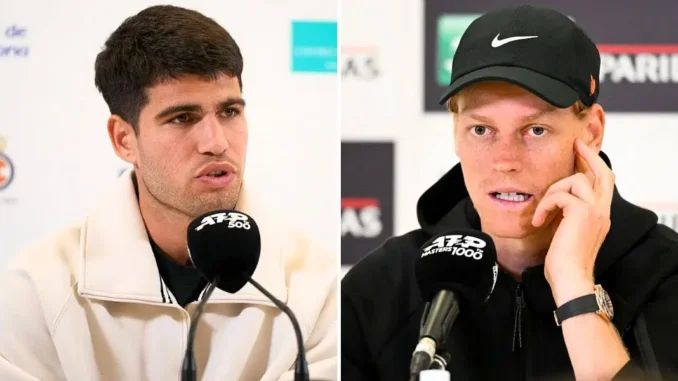
Fresh off his electrifying 7-6(5), 6-1 victory over Jannik Sinner in the Italian Open final on May 18, 2025, Carlos Alcaraz has ignited discussion with revealing comments about his decision not to contact the World No. 1 during his three-month doping ban. The 22-year-old Spaniard, who halted Sinner’s 26-match winning streak in Rome, responded to the Italian’s grievances about feeling unsupported by peers during his suspension. Alcaraz’s forthright remarks, delivered in a post-match press conference, peel back the layers of their rivalry, offering insight into the delicate dance of competition and camaraderie as they gear up for Roland Garros.
Sinner’s absence from February 9 to May 4, 2025, followed two positive tests for Clostebol, a banned anabolic steroid, in March 2024. Though the World Anti-Doping Agency deemed it an accidental contamination, ruling “no fault or negligence,” Sinner shared the emotional weight of his isolation. “At the start, I was a bit confused because I didn’t know exactly what I wanted to do,” he said upon arriving at the Foro Italico, where fans greeted him with signs reading “Bentornato Jannik.” He admitted that the silence from many ATP peers, including those he expected to reach out, left him feeling adrift, though he chose not to point fingers.
Alcaraz, however, owned his decision to stay distant. “I didn’t speak to him during his disqualification. Everyone looks out for themselves,” he told Spanish media, underscoring the competitive edge that defines their relationship. “We’re not very close. At the end of the day, we’re also rivals, and I can’t have a close friendship with someone I want to beat.” Despite the stark honesty, Alcaraz maintained their off-court rapport is amicable. “We have a good relationship,” he said, suggesting a professional respect rather than deep personal ties. His comments divided fans, with some on social media labeling him cold and others praising his focus in a sport where mental sharpness is paramount.
The Rome final was a testament to why Alcaraz and Sinner, who’ve claimed the last five Grand Slams between them, are tennis’s torchbearers. Alcaraz, now leading their head-to-head 7-4, lauded Sinner’s comeback. “I’m just really happy to see Jannik back at this amazing level,” he said post-match, marveling at Sinner’s run to the final after months away. Sinner, in turn, acknowledged Alcaraz’s clay-court dominance: “On clay right now, you’re the best player.” Yet, Alcaraz’s earlier enthusiasm for Sinner’s return—“It’s great for me, for tennis, and for the fans to have him around again”—jars with his admission of silence, revealing the tension between public support and private boundaries.
Sinner’s ban tested his resolve, but support from allies like Lorenzo Musetti and Jack Draper, who called out the “unnecessary” hate Sinner faced, kept him grounded. His Rome campaign, reaching the final without dropping a set until Alcaraz, reaffirmed his elite status. For Alcaraz, the victory restored him to World No. 2 and bolstered his Roland Garros credentials. “Beating Jannik, winning Rome, both things mixed together give you great confidence,” he said, eyeing a second French Open crown.
As Roland Garros approaches, the Alcaraz-Sinner narrative adds a compelling layer to an already fierce rivalry. Their mutual respect is clear, but Alcaraz’s candor exposes the solitary reality of stardom, where rivalry often trumps friendship. Sinner, rebuilding trust and form, faces a path of redemption, while Alcaraz aims to cement his dominance. With Paris on the horizon, their clash promises to be as much about mental fortitude as it is about forehands and serves, setting the stage for a blockbuster showdown.
Leave a Reply